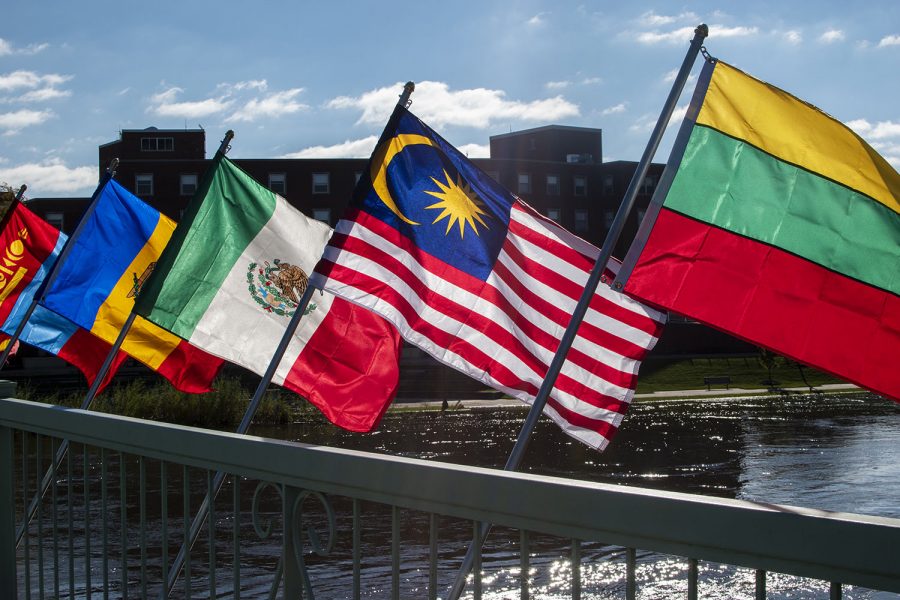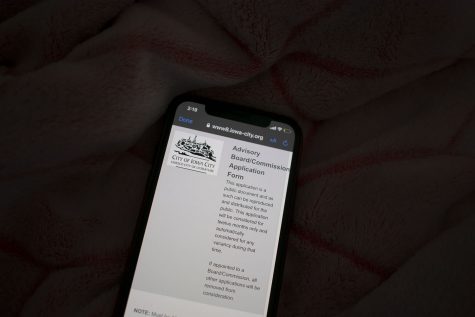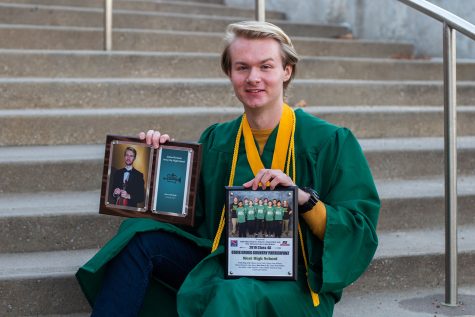University of Iowa International Programs embraces diversity, equity, and inclusion during International Education Week
University leaders are using International Education Week 2020 to celebrate global citizenship and the importance of diversity, equity, and inclusion in international experiences.
Various flags are seen on Monday, October 15, 2018. There are 120 flags being displayed on the Iowa Memorial Union Pedestrian Bridge to recognize the international students on campus.
November 17, 2020
Amid COVID-19 chaos – rising cases, closing borders, tighter travel restrictions, and global animosity – University of Iowa International Programs is using International Education Week to recognize the value of global citizenship and move toward pillars of diversity, equity, and inclusion across campus and in the international sphere.
The week-long celebration kicked off Nov. 16 with a series of events, including a WorldCanvass presentation where current and former Hawkeyes were recognized by UI President Bruce Harreld for their international achievements.
Harreld presented the International Impact Award to Sarah Lande and Patrick and Susan Keefe, and Global Student Awards to Mishma Nixon and Nicolas Stroup.
“It really makes our world better,” Harreld said, “…to have these [international] types of bonds and relationships.”
International Education Week is sponsored by the U.S. Departments of State and Education, UI International Programs Dean Russ Ganim said, and it aims to foster contact between different cultures.
Ganim said the tradition of recognizing international accomplishments goes back to the 1950s and ’60s, even though there was not a designated week back then. Now, the week occurs in late November, so universities, lower education, and other sectors can recognize their international achievements.
It’s a little bit different this year because of the pandemic, Ganim said, but with every event being virtual and recorded, the celebration is more inclusive in terms of proximity and convenience.
“This year for International Education Week, the theme is diversity, equity, and inclusion and how international education promotes DEI,” Ganim said.
Fortunately, Ganim said, the International Programs department has not been affected by recent diversity, equity, and inclusion freezes across the UI.
In the realm of diversity, equity, and inclusion, Ganim said International Programs has a significant collaboration with the UI Division of Diversity, Equity, and Inclusion in reviving the Phi Beta Delta – Alpha Tau Honor Society chapter at the UI.
The society recognizes achievement in international education for faculty, staff, and students, Ganim said. The society holds academic symposiums and social events surrounding international education, he said.
The one thing they are working toward this year within the Phi Beta Delta – Alpha Tau chapter is to have an affinity graduation on campus for international students.
The keynote speaker for this year’s celebration is CEO of Diversity Abroad Andrew Gordon, who focuses on promoting international education to underserved communities. Gordon gave a talk titled “Advancing Equity & Inclusion Through Global Engagement,” on Tuesday as part of the UI’s “Commitment to Internationalization” lecture series.
In an email to The Daily Iowan, Associate Director of International Health, Safety and Security in UI International Programs Autumn Tallman wrote that engaging in diversity across people and perspectives is at the core of education abroad. In 2018-2019 school year, 17.5 percent of recent UI undergraduates studying abroad were from underrepresented groups, Tallman wrote.
“The total minority undergraduate population at the UI during the same time period is almost 21 percent,” Tallman wrote. “In recent years, the percentage of minority students studying abroad has at times exceeded the percentage of minority undergraduates on campus.”
When UI senior Amani Ali studied abroad through the India Winterim Program, she said it was one of the best experiences of her life.
Ali, who is a refugee from Sudan and grew up in the U.S., said studying aspects of India’s medical practices during her time abroad was instrumental toward her global health studies major and experiencing a new culture.
“It was an amazing experience,” Ali said. “It was perfect.”
Ali said she received the Diversity Abroad Ambassador Scholarship and worked with her advisor, the Study Abroad Office, and the career center to work on other scholarship applications that ended up covering the cost of her entire experience.
“I’m a refugee, I’m also a first-generation college student, and I’m a minority, so for us…when I first came to campus, I’m like ‘Oh heck no, I’m not going to study abroad’,” Ali said. “Because there is no way I can afford to study abroad because my family doesn’t have that kind of resources or that kind of money to help me out so I always thought I would never do it!”
Ali said things changed when her global health studies advisor encouraged her to apply for the program her junior year. She said she was stunned at the resources she could tap into through asking the right questions about funding.
“I just wish the university promoted first-generation college students and also minorities to study abroad more often,” Ali said. “I feel like minorities and first-generation college students are really encouraged to study abroad, but I wish the university did a better job of advertising that aspect of it.”
In recent years, Tallman added, a lot of work has been put into breaking down barriers traditionally faced by minorities and underrepresented communities so that they can participate in programs abroad.
“Being underrepresented can make any pursuit seem mysterious and inaccessible.” Tallman wrote. “If you don’t see yourself reflected in the student cohort, you may wonder if education abroad will be of value, accessible, or even safe to pursue based on your identity.”
Scholarships and targeted outreach are among initiatives the UI uses to promote diversity abroad, Tallman wrote. UI Study Abroad actively pairs with programs abroad that see diversity as essential to their mission and success.
“Diversity, equity and inclusion are critical global issues that play out in different ways around the world,” Tallman wrote. “Students who study abroad come home with a broader context in which to orient their own life experiences. That is a powerful experience for anyone, and especially empowering for students seeking ways to effect change in the world.”




















